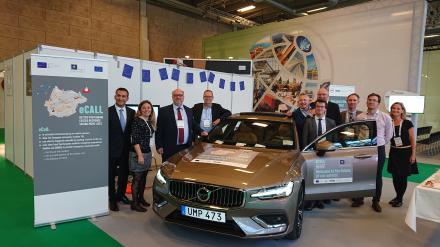Carmaker Volvo presented its V60 model, the first one equipped with the Pan-European eCall emergency response system, at the ITS World Congress 2018 in Copenhagen on 18 September. eCall leverages the precise positioning offered by Galileo and EGNOS to quickly share the location with emergency services in the event of a road accident, automatically dialling the European emergency number 112.
The Volvo V60 eCall launch represents an important milestone for the European space programme, as it is the first vehicle´s passive safety application enabled by Galileo and EGNOS. Speaking at the event, GSA Officer Alberto Fernández Wyttenbach stressed that this milestone could not have been reached without international industrial cooperation. “This level of industrial cooperation is something that the EU is particularly trying to foster,” he said.
important milestone for the European space programme, as it is the first vehicle´s passive safety application enabled by Galileo and EGNOS. Speaking at the event, GSA Officer Alberto Fernández Wyttenbach stressed that this milestone could not have been reached without international industrial cooperation. “This level of industrial cooperation is something that the EU is particularly trying to foster,” he said.
Going global
Volvo is the first carmaker to announce that it is equipping its vehicles with eCall, complementing the previous OnCall system for technical assistance. Leif Ivarsson, Legal Manager for Telematics & Connectivity at Volvo Cars noted that Russia was first country to introduce a similar system, with its ERA-GLONASS rapid response. However, following the rollout of the pan-European eCall, Ivarsson said that the system could be used as a template for similar systems in Malaysia, Korea, Japan or the United Arab Emirates in the near future. “In a few years the service might be global,” he said.
Read this: eCall emergency alert system launched
Andreas Bergvall from ACTIA Nordic in Sweden, the manufacturer of the device installed in the Volvo cars, highlighted the added value provided by Galileo. “The contribution is twofold. First of all there is the increased signal availability that it provides, this is very important.
Equally important is the significant enhancement of accuracy positioning,” he said, adding that Galileo’s high accuracy will be also a key enabler of new services, such as automated driving.
100% reliable
To provide the required level of service, eCall needs to be 100% reliable, NavCert Managing Director Martin Grzebellus said at the launch event. “As it is the first time that Galileo is playing a key role in the vehicle´s safety, so certification is very important,” he said.
Grzebellus said that while Volvo is the first carmaker to launch eCall on the European market, NavCert is currently testing eCall in 10 other vehicles, with the next launch expected in just few weeks, so stay tuned!
The eCall device in the Volvo vehicles is manufactured by ACTIA Nordic in Sweden, is supported by the WirelessCar platform, and has been successfully tested by the NavCert eCall Laboratory in Germany. The readiness of automotive suppliers and technical services to equip the vehicles was partially due to actions taken by the GSA and the European Commission’s Joint Research Centre, who launched a testing campaign and produced a joint report containing a set of guidelines to facilitate the implementation of eCall testing in compliance with the EU Regulation. Indeed, more eCall models from Volvo are expected to be launched by the end of 2018, in particular the S60 and the V60CC.
What is eCall?
eCall devices automatically dial the European emergency number 112 to alert rescue services in the event of an accident. The system sends the exact location to responders, along with the time of the incident and the direction of travel, even if the driver is unconscious or unable to make a phone call, thereby reducing the response time for road accidents and saving more lives. An eCall can also be triggered manually by pushing a button in the car, for example by a witness to a serious accident.
eCall only transmits data that is absolutely necessary when an accident occurs. Information only leaves the car in the event of a severe accident and is not stored any longer than necessary.
It is estimated that eCall will speed up emergency response times by 40% in urban areas and 50% in the countryside and reduce the number of fatalities by at least 4% and the number of severe injuries by 6%. You can find more information about eCall here.
Media note: This feature can be republished without charge provided the European GNSS Agency (GSA) is acknowledged as the source at the top or the bottom of the story. You must request permission before you use any of the photographs on the site. If you republish, we would be grateful if you could link back to the GSA website (http://www.gsa.europa.eu).